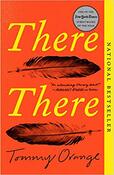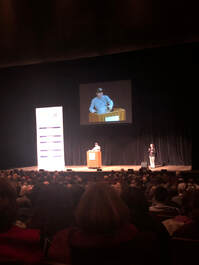|
Summary: We all came to the powwow for different reasons. The messy, dangling threads of our lives got pulled into a braid--tied to the back of everything we'd been doing all along to get us here. There will be death and playing dead, there will be screams and unbearable silences, forever-silences, and a kind of time-travel, at the moment the gunshots start, when we look around and see ourselves as we are, in our regalia, and something in our blood will recoil then boil hot enough to burn through time and place and memory. We'll go back to where we came from, when we were people running from bullets at the end of that old world. The tragedy of it all will be unspeakable, that we've been fighting for decades to be recognized as a present-tense people, modern and relevant, only to die in the grass wearing feathers." (from Goodreads) My Ramblings: I read this book as part of my Indigenous Lit and the West course at Montana State University. It was... difficult. It was also pretty amazing. Told from multiple viewpoints the story unravels in a spiral. You are introduced to characters, introduced to their lives and struggles and hopes. Slowly connections start to form, a relative here, a passing acquaintance there. Each story is both completely individual and one thread in the whole tapestry. In that way I found myself deeply invested in the characters and their chapters, while also finding myself jumping backwards to double check if I had really read what I thought I read. The context changing as the spiral tightens. Everything leading to the powwow and the events that unfold there. I won't go into it, to talk about where it all leads is to spoil the ending and the ending is both shocking and the inevitable conclusion of the paths the characters were all walking. There, There somehow manages to be both uniquely Native American while providing a universality that allows those who don't share this specific history to make a connection nonetheless. There, There deserves all the accolades and awards it has received. If you haven't read it, do. It's one that I know I will refer back to and read again. A Question on Analyzing Books: So like I said, we read this book as part of my Indigenous Lit course and as part of that course we dug deep into the books we read. Stories by and about Native American writers like Morning Dove and Tommy Orange. Books published 100 years ago and those published just last year. As we read we looked for meaning, tied the stories on the pages to the events occurring at the time, argued about what the author might have meant by a reference. Through it all we worked together, and sometimes against each other, to figure out why these books in particular were important, why the author wrote them, what importance they might have seen. Sometimes there were interviews that we could reference or other articles that would give insight to what the author felt or meant, but more often then not it was just us, guessing at meaning by using the clues were were able to pull from the story and our knowledge of the time the story was set in or even written in. It's a fun exercise and I enjoy the debate, of seeing where our personal biases and experiences color our interpretation. Still, something about it has always left me on edge, because I have seen in teaching where a question on a state exam or a story in an ELA unit will give a definite answer to something in a story only to have the actual authors of the story come out and say "well, that's not what I meant at all". All of this is to say that whenever possible I try to ask the author, and I try to impress upon my students to ask the author. Even if they don't answer, at least there is an attempt to get to the heart of it.
For me I was delighted to see that he lectured much in the same way I teach. Basically, here's what we should absolutely remember to say, but also let me tell you this cool story. Orange was concerned that he was not a lecturer, but I found the whole thing pretty spot on. At there end there was time for questions, which is where this whole thing really comes back together for me. I was lucky enough to be able to ask the last question of the night and I chose to ask about something that had come up in our discussions in class. There, There opens with what we generally categorized (in class) as a non-fiction essay prologue that speaks to the violent history that Native Americans had to deal with in the US. There is also an interlude that delves back into those topics. As a class we talked about the importance of the prologue and why Orange might have included it. We talked about how it gave the book context, gave it a backstory. We talked about how if you were not a person with a knowledge of how Native Americans were treated in the US, it would help frame the story to come. So last night at the lecture I asked Orange why he had chosen to write what was essentially a non-fiction Prologue before moving into the book proper. His response was pretty simple, and made total sense, while not at all being anything we had discussed in class. Orange first said that he didn't even know that he had written a non-fiction essay. That it was just writing and the information was important to the story. He also said that what he loves about prologues is that you don't have to follow any of the rules that you set for the rest of the book. His book is told from multiple perspectives set in the present day, this important information didn't particularly fit into that format, so it became the prologue. He said the other great thing about a prologue is that if you're a person who hates a prologue you can just skip it and still get the story. This information, while important, wasn't part of the narrative proper and so if you read it, the information enriched the story, but if you didn't read it, you would still get the story. In all the analyzing we did, these weren't things we considered. That isn't to say the things we spoke about were wrong, they just simply weren't the whole picture. Which brings me back around to my dilemma. How do you have students (or adults for that matter) make personal connections and analyze literature while also balancing the authors actual perspective? Do authors like us to reach out and ask, and if so what is the best way to do so? What if the author is no longer living- is there a way to figure it out or is it enough to simply say "we may never know what they truly meant, but here is what we can infer"? These are questions that I don't have an answer to, but I'm glad I was given the opportunity to ask Orange last night, his answer enhanced and shifted my reading of his book, which is always an exciting thing. While there is no video of the lecture I attended last night, I am attaching a video of Orange speaking at Politics and Prose at the Wharf in June 2018. He reads from the book and at the 12:20 mark he specifically speaks to the prologue.
0 Comments
|
About
Home of the ramblings of an avid reader. In my spare time I also run, ride, teach, go on adventures and get into shenanigans. Find me here: Goodreads Etsy TikTok Categories
All
Archives
October 2022
|



 RSS Feed
RSS Feed








